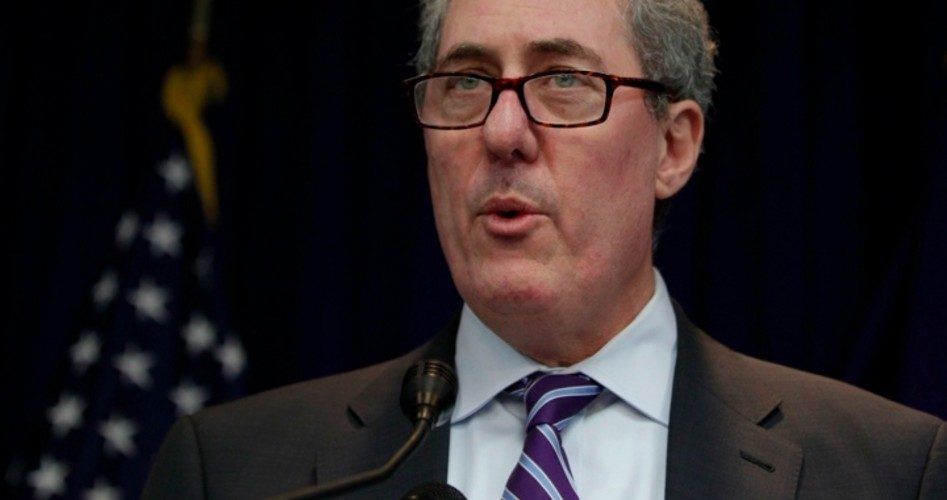
At a press conference held last week at the end of the most recent round of negotiations on the Trans-Pacific Partnership (TPP), trade reps from the 12 member countries report that despite their best efforts to rush to reach an agreement, “significant gaps” in the details remain.
Not only are the negotiators finding it hard to mesh the trade standards of 12 disparate economies and cultures, but the impasse is so significant that no schedule was set for future meetings.
While this is good news for those of us committed to keeping the United States free from these sovereignty transfers posing as trade pacts, we’re not out of the woods yet.
At the press conference, U.S. Trade Representative Michael Froman (shown) said, “Our focus is on achieving an agreement among all 12 of us and that agreement needs to be that ambitious, comprehensive, high-standard agreement.”
A significant part of Froman’s (and President Obama’s) plan to foist this latest scheme on the American people is the obtaining of “fast track trade authority” from Congress. Happily, the globalists seem to be stymied here, as well.
The Washington Post reported February 19 on the pressure the president is feeling from his own party to pump the brakes on the TPP and fast track authority:
Already, Senate Majority Leader Harry M. Reid (D-Nev.) and House Minority Leader Nancy Pelosi (D-Calif.) are opposed to moving forward with granting Obama fast-track authority.
“Everyone would be well-advised just to not push this right now,” Reid said late last month. He’s generally opposed to large global trade agreements.
Pelosi doesn’t oppose the concept of fast-track, but said last week that she is against a bipartisan measure introduced by Sens. Max Baucus (D-Mont.), Orrin G. Hatch (R-Utah) and Rep. Dave Camp (R-Mich.) that would give Obama the authority.
Resistance from Reid and Pelosi usually would be enough to at least ease the White House push. But Obama and Vice President Biden have also been directly confronted on the issue in recent weeks by rank-and-file members. But 151 House Democrats co-signed a letter late last year written by Rep. Rosa DeLauro (D-Conn.) to voice opposition to fast track authority and the TPP — more than half of the caucus. And during a recent closed-door meeting at the White House, Obama took two questions on the subject, while Biden faced a grilling on the subject at the House Democratic policy retreat last week.
What’s the point, then? Why is the president and his trade reps so insistent on getting the TPP passed by hook or by crook, particularly in light of the political poison pill it seems to be?
As with the multitude of similar trade pacts the United States has formed, the ultimate aim of the TPP is the creation of a regional super government, thus the stonewalling of federal lawmakers who dare seek to assert some sort of oversight.
In the case of the TPP, the zone would be called the Free Trade Area of the Asia Pacific (FTAAP). Members of the proposed “free trade” bloc include all the current TPP participants: Malaysia, Singapore, Japan, Vietnam, Brunei, Australia, New Zealand, Peru, Mexico, Chile, Canada, and the United States. The regional trading partnership is intended to establish “a comprehensive free trade agreement across the region.”
An article in the Georgetown Journal of International Law says that the TPP negotiations “are designed to culminate in a ‘gold standard’ free trade agreement (FTA).”
In fact, the authors of the Georgetown review state that the ultimate goal of the TPP isn’t just the creation of an FTAAP. They insist that the TPP is a “trade agreement designed to achieve broad liberalization and a high degree of economic integration among the parties.” There’s that word “integration” again.
Integration is a word that is painful to the ears of constitutionalists and those unwilling to surrender U.S. sovereignty to a committee of globalists who are unelected by the American people and unaccountable to them. Integration is an internationalist tool for subordinating American law to the globalist bureaucracy at the United Nations.
Economic and political integration will push the once-independent United States of America into yet another collectivist bloc that will facilitate the complete dissolution of our nation and our states into no more than impotent members of a one-world government.
In an article examining the devastating effects of the TPP, William F. Jasper of The New American identified the end game for these globalists and their secretly planned trade pacts. Wrote Jasper:
The architects and promoters of the TPP and FTAAP frequently point with admiration to the “integration” process of the European Union (EU) as the model they would like to see implemented for the Asia-Pacific rim nations. As with the Transatlantic Trade and Investment Partnership (TTIP), the Trans-Pacific Partnership has been designed to follow the EU example of relentless widening and deepening, constantly eroding national sovereignty, while building “transnational governance” that is not restrained by the checks and balances of national constitutions.
Equally significant is that 600 industry lobbyists and “advisors,” as well as unelected trade representatives, are at the table, while representatives from the public at large and businesses other than huge monopolies are conspicuously absent.
Each of the “partners” to the pact, including foreign corporations, would be exempted from abiding by American laws governing trade disputes. Moreover, the sovereignty of the United States and the Constitution’s enumeration of powers would once again be sacrificed on the altar of global government by subordinating U.S. laws passed by duly elected representatives of the people to a code of regulations created by a team of transnational bureaucrats.
Americans who study the subject realize that the domestic legal processes being carried out in secret by the globalists sitting around the TPP negotiating table is an attack on American laws, American courts, American freedom of expression, American sovereignty, and the American Constitution.
The situation is dire indeed. In a recent video presentation, William F. Jasper makes a compelling case for his claim that the TPP is “more dangerous than ObamaCare.”
ObamaCare and the TPP have something else in common, besides the threat they pose to our sovereignty and the principle of enumerated powers.
Regardless of presidential fervor for the surrender of sovereignty to globalists or the forcing of Americans to purchase commodities, no treaty or “law” that violates the Constitution could ever become the law of the land.
When it comes to trade agreements or any act passed by Congress, the analysis must begin by looking within the four corners of the Constitution.
It only makes sense that the federal government cannot enter into a treaty that would contravene the Constitution. If I tell my teenage son that he can drive my car to the movies, does that give him permission to drive it into a lake?
To put a finer point on it, Article VI of the Constitution says:
This Constitution, and the laws of the United States which shall be made in pursuance thereof; and all treaties made, or which shall be made, under the authority of the United States, shall be the supreme law of the land; and the judges in every state shall be bound thereby, anything in the Constitution or laws of any State to the contrary notwithstanding.
That means that in order to have any lawful effect, the object of any treaty signed by the president and ratified by the Senate must lay within their constitutional authority (“the authority of the United States”).
In the case of the TPP and ObamaCare, there is no doubt that many of their key provisions directly violate the Constitution in myriad ways.
If the Congress and president were to disregard these restrictions on their power as they so often do, the mandates of the resulting treaty would not be the law of land, as Alexander Hamilton explained in The Federalist, No. 33:
If a number of political societies enter into a larger political society, the laws which the latter may enact, pursuant to the powers intrusted [sic] to it by its constitution, must necessarily be supreme over those societies and the individuals of whom they are composed…. But it will not follow from this doctrine that acts of the larger society which are not pursuant to its constitutional powers, but which are invasions of the residuary authorities of the smaller societies, will become the supreme law of the land. These will be merely acts of usurpation, and will deserve to be treated as such. [Emphasis in original.]
Thomas Jefferson echoed that point specifically as it pertains to the topic of treaties. Jefferson wrote, “In giving to the President and Senate a power to make treaties, the Constitution meant only to authorize them to carry into effect, by way of treaty, any powers they might constitutionally exercise.”
At another time, he reiterated this principle of constitutional construction, saying, “Surely the President and Senate cannot do by treaty what the whole government is interdicted from doing in any way.”
In a letter to his colleague, collaborator, and friend James Madison, Jefferson agreed that “the objects on which the President and Senate may exclusively act by treaty are much reduced” by application of the principle that a treaty cannot contradict the Constitution and yet still enjoy the approval of that document. Again, my son couldn’t justify crashing my car into a lake by pointing to my permission to drive it to the movies.
Despite these sound principles of the rule of law and constitutional supremacy and the roadblocks to ratification of the TPP, a word of caution is necessary.
Although in reality, as proved above, treaties and acts that violate the Constitution are prima facie null, void, of no legal effect, the Supreme Court has come down on both sides of the supremacy issue, and despite not having that authority, the Supreme Court has failed to protect the Constitution in many recent opportunities.
Photo of U.S. Trade Representative Michael Froman: AP Images
Joe A. Wolverton, II, J.D. is a correspondent for The New American and travels nationwide speaking on nullification, the Second Amendment, the surveillance state, and other constitutional issues. Follow him on Twitter @TNAJoeWolverton and he can be reached at [email protected].



